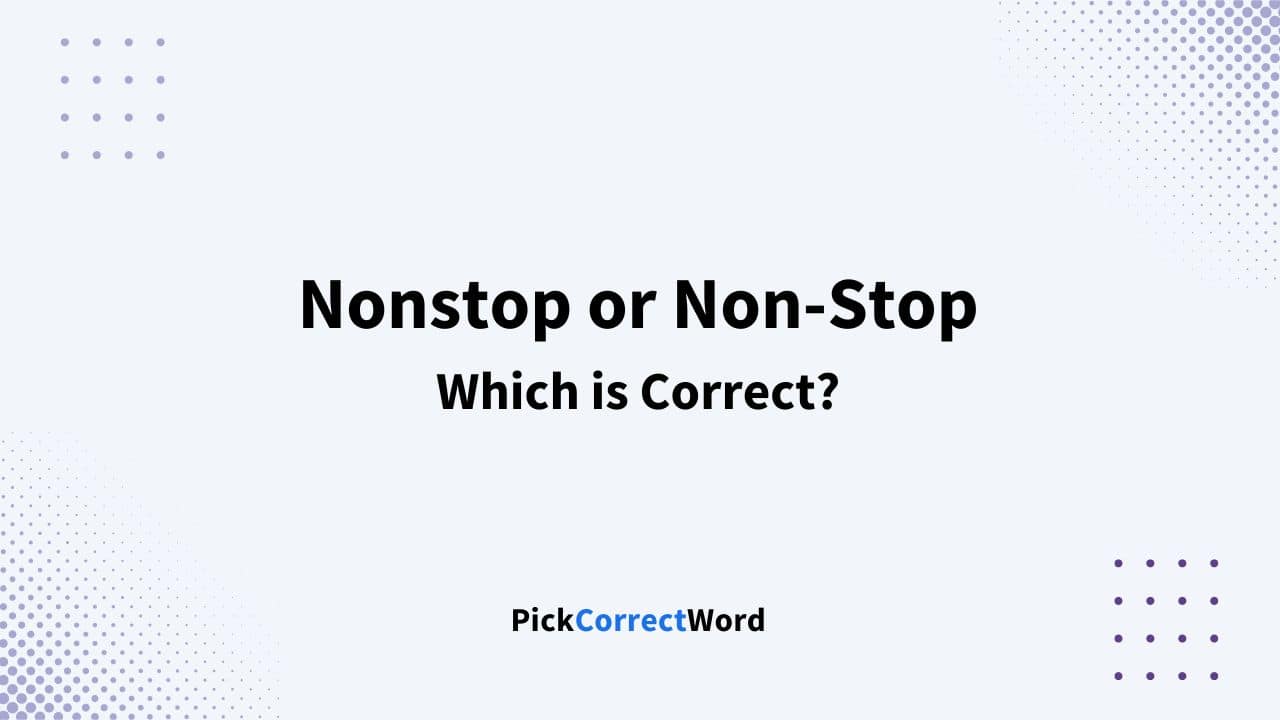You may have seen different ways to write the word that means something keeps going without any breaks. If you’re from America, you’ve likely used “nonstop.”
But if you’re more familiar with British English, you’ve probably written it as “non-stop,” with a hyphen connecting the words.
Whether you choose “nonstop” or “non-stop” really just depends on the style of English you’re using.
Nonstop or Non-Stop? Which is Correct?
In American English, you would use “nonstop,” while in British English, you would write “non-stop.” Both words have the same meaning: something that keeps going without any breaks.
Both versions are easy to understand. “Nonstop” is a combined adjective made from the prefix “non-” (which means ‘not’ or ‘no’) and the word “stop.” It describes a noun to show an action that doesn’t stop.
“Non-stop” just follows the British way of often using a hyphen with combined words, compared to American English.
American English:
- Nonstop: “I’m taking a nonstop flight to Los Angeles.”
British English:
- Non-stop: “There is a non-stop train to London at 3.”
Nonstop: Meaning and Usage
In American English, you would typically write “nonstop” to mean something that keeps going without any pauses. You can use it to talk about ongoing activity, like “nonstop rain” or “nonstop service.”
You can also change this adjective into an adverb, as in “working nonstop,” to show how an action is being done.
To use “nonstop” effectively, it helps to see it in action. Consider a sentence like
- “She worked nonstop to meet the deadline,”
Here, nonstop portrays the person’s continuous effort. Just remember to put “nonstop” before the noun when it’s an adjective, or after the verb when it’s used as an adverb.
Non-stop: Meaning and Usage
British English tends to prefer the hyphenated ‘non-stop’. When referring to something uninterrupted.
For example:
- “The concert went on non-stop for three hours.”
Why to hyphenate non-stop
The hyphen in ‘non-stop’ is more common in British English because it follows the convention of hyphenating compound words.
The hyphen comes in handy when the mix of the prefix ‘non-‘ and the next word might cause confusion without it. Using a hyphen makes it clear that ‘non’ is a prefix to ‘stop’ and not a separate word. This clarity can be especially useful when you’re using compound modifiers before a noun, like in “a non-stop flight.”
Non Stop: Is it Correct?
In formal writing, it’s usually not seen as correct to write ‘non stop’ without a hyphen.
This is because ‘non stop’ could confuse people, as it makes ‘non’ seem like a separate word when it’s actually just a prefix. So, it’s always safer for you to stick with ‘nonstop’ or ‘non-stop’, depending on who you’re writing for and whether you’re using American or British English.
Examples of Using “Nonstop“ in A Sentence
“She worked nonstop to meet the project deadline.”
“The phone rang nonstop throughout the night.”
“Their nonstop chatter could be heard across the hall.”
“The band played music nonstop during the concert.”
“He watched films nonstop over the weekend.”
“It seemed like the rain would pour nonstop.”
Frequently Asked Questions
What type of word is nonstop?
“Nonstop” functions as an adjective and an adverb, describing actions or items that continue without any breaks or interruptions.
Is the term ‘nonstop’ have a formal or informal?
The term “nonstop” is considered formal and is commonly used in both written and spoken English to describe continuous activities. It’s especially prevalent in contexts like travel and media, where ongoing events or direct routes are discussed.
Is non-stop formal or informal?
Similarly, “non-stop” with a hyphen is also formal. It’s standard in British English and is used correctly in written documentation and professional communication. No matter the form, whether hyphenated or combined, the term retains its formal status.


